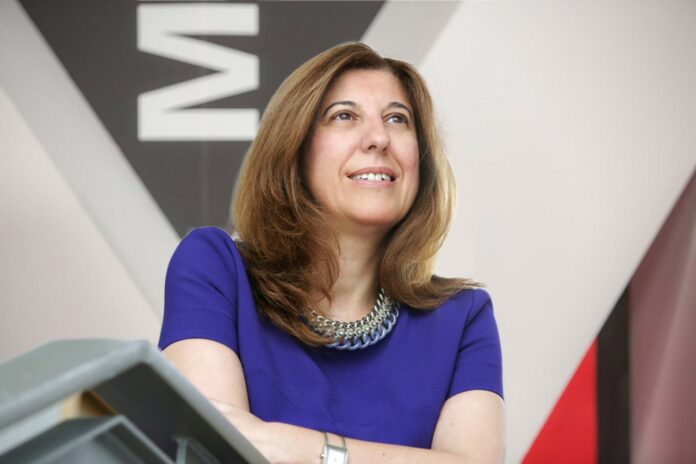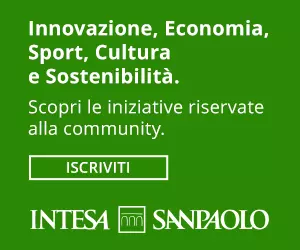ROME (ITALPRESS/MNA) – A leading international pharmaceutical group, present in 140 countries with almost 18,000 employees, 18 manufacturing sites, and 9 research centers worldwide, Menarini demonstrates a clear international vocation in a context where geographical distances are diminishing and the pace of innovation is accelerating by the day. For this reason, research and development is a key pillar “at the heart of our company,” explains CEO, Elcin Barker Ergun, and one of the reasons why Menarini has decided to bolster its presence and strengthen its partnerships, particularly in the United States.
Elcin Barker Ergun, who has over 20 years of international experience in the pharmaceutical industry, joined Menarini in 2019, and since then the company’s strategy has been focused even more on specific areas. “We have been very strong in primary and speciality care, and our Board wanted to accelerate our efforts in oncology, as cancer represents the second leading cause of death worldwide after cardiovascular disease, which is our prime area of focus,” she noted during a recent interview given to the Italpress Agency.
The real “turning point” in the Group’s growth journey came just one year after her arrival with the acquisition of the US-based Stemline Therapeutics in 2020. “I joined Menarini in 2019 as CEO, and our board and shareholders expressed three very clear priorities. We were present in 70 countries directly and in 140 countries overall, but we did not have a pharmaceutical division in the United States; we were present there only with our diagnostics division,” Barker Ergun recounts. The priorities were, therefore, to bring the Group to the United States in the pharmaceutical area, accelerate oncology, and further accelerate innovation capabilities. “We decided that the fastest and most productive way was to acquire a US biotechnology company that was already a player in innovation, particularly located in the East Coast of the United States, an area known for being the major hub of biopharma innovation in the world,” she further explains.
The acquisition of Stemline allowed Menarini to close a deal with a Boston based biotech company for the rights to a key product in the fight against breast cancer just one month later, a drug which is now part of Menarini’s oncology portfolio. “So, for us, it was pivotal to make this acquisition, and it also shows just how bold the vision of Menarini and our shareholders is,” says Barker Ergun, recalling that the drug, which received fast track and priority review approval from the US Food and Drug Administration (FDA) in January 2023 and the approval of the European Medicines Agency (EMA) in September of the same year, represents the first endocrine innovation in a certain type of breast cancer in 20 years.
“Our innovation has allowed us to bring a targeted drug, with a precision medicine approach, to provide an important treatment option that affects up to 40% of patients with metastatic breast cancer,” continues Menarini’s CEO, and now this important drug for the treatment of a specific type of metastatic breast cancer is already marketed by Menarini in the United States, United Kingdom, and several European countries, including Italy, the Middle East, Africa, and Asia.
“A study is also underway to evaluate the effectiveness of this product by our research teams in the early stages of breast cancer: this is very important because breast cancer is one of the highest incidence cancers where around 320,000 people in the US and almost 550,000 people in Europe receive a breast cancer diagnosis each year and early intervention is critical,” she adds.
Menarini’s scope also extends to other forms of cancer, such as hematological tumors and other women’s cancers. This was a result of effective partnerships where Menarini, through these partnerships, also got access in certain territories like Europe, Middle East Africa and Latin America for a product dedicated to the treatment of multiple myeloma. Menarini has already launched the drug in Germany, UK, Italy, France and is currently launching it in Spain. “This product is now the subject of further research into its interaction in myelofibrosis, a rare and very important orphan hematological cancer, where there is a huge unmet need. It is estimated that, starting from first part of next year, we could receive the first results of the ongoing clinical trials and, if these are positive, this could represent a significant step forward.”
But oncology is not the Group’s only priority, as Barker Ergun reminds us that cardiovascular diseases are “the deadliest diseases in the world,” with over 17 million victims every year. In this case, another fundamental partnership has been established with biopharmaceutical company New Amsterdam Pharma. “We are their European partner, and after three successful clinical trials last year, we have just made our submission for regulatory authorisation in Europe. If all goes well, we could potentially be able to bring a new generation lipid lowering drug to Europe next year, starting with Germany,” declares Barker Ergun.
Menarini is also focusing on respiratory diseases and diabetes, but the “boldness” that characterizes the Group is perhaps most discernible in the fight against antimicrobial resistance (AMR), a very challenging area where the current model, aimed at bringing novel antibiotics to patients, is ‘broken’. “There are not enough products”, comments Barker Ergun, “because incentives to make further research and bring products to market, do not exist in the AMR area.” Where incentives have been introduced, such as those for orphan diseases, “the results have been remarkable”, she adds.
Nevertheless, it is a challenge that must be taken on, according to Barker Ergun, because it is a “silent pandemic,” with estimated millions of AMR-associated deaths worldwide each year and “a very rapid escalation” in the figures. “We’re one of the few companies left that are investing in this area”, working with authorities, the pharmaceutical industry, and patient associations to find concrete and viable solutions, such as an orphan-like designation for AMR antibiotics.
“We talked about oncology, for example” where many patients are being treated for oncological diseases but about 30 percent of these patients ultimately die from antimicrobial-resistant infections in hospital wards. “This is the very sad side of the devastating antimicrobial resistance and one of the many reasons why we need effective treatments to combat it,” observes the CEO of Menarini.
The deepening of research, geographical expansion, and new collaborations being established around the globe all unavoidably contend with a world that is, in itself, undergoing constant and profound change, particularly with the introduction of new technologies. Today, like so many other industries, innovation and artificial intelligence are also changing the perspectives and the goals of the pharmaceutical sector.
“I am a computer engineer by background, so I am very happy to see that we are finally starting to tap into AI in the pharmaceutical industry,” notes Barker Ergun. “In my view, the most important application of AI in the pharmaceutical industry today is in the discovery stage,” which represents the longest, most challenging, and riskiest part of pharmaceutical research. Until now, “it would take more than 10 years to discover a new molecule in our industry. Today, thanks to generative artificial intelligence, companies can achieve this in two or three years,” she adds.
In this case, Menarini has chosen Insilico Medicine as its partner, one of the global life science leaders in generative artificial intelligence. “We have acquired two of their assets, one of which is already in clinical trials for breast cancer,” the CEO specifies. “Beyond the “discovery” phase, AI can create efficiencies in many steps within the clinical pathway, accelerating various stages, such as clinical trials, medical writing, and the regulatory procedures in addition to the superb analytical capabilities it provides. Still its main translation into the pharmaceutical field is its breakthrough capability in discovery and, on the other hand, it may enable a lot of enhancements that can really accelerate the time needed to get new products to patients,” concludes Barker Ergun.
However, artificial intelligence, precision technologies, and new fields of research cannot overlook the values that remain unchanged and must accompany every step, particularly in a sector like pharmaceuticals. “We are one of the oldest pharmaceutical companies in the world. We are extremely proud of our Italian heritage and for us, people centricity is incredibly important,” explains the CEO of Menarini. “Everything we do is through our people, who really devote significant efforts, also in difficult territories in many parts of the world. We owe them a lot. The second important value, in line with this, is our patient focus,” she continues. “That is why we have chosen three areas which are the world’s deadliest diseases: cardiovascular diseases, oncology, and respiratory diseases. These areas currently have the three highest mortality rates around the globe today,” the CEO further observes, adding that quality is the company’s third core value, something Menarini has always strived for and is “in everything we do”.
Finally, three additional “values” accompany Menarini’s day to day activities: “curiosity, passion, and urgency to act.” “We believe that urgency to act is extremely important, given the fact that we deal with the diseases that are amongst those with the highest toll on human lives globally. Our curious and passionate workforce is committed to making our company succeed all the way from preclinical research to late-stage trials, through access and regulatory operations to distribution,” to bring solutions to millions of patients around the world, concludes the CEO of Menarini.
– photo Menarini –
(ITALPRESS).















